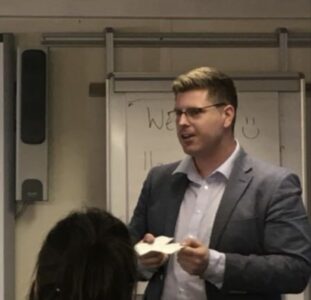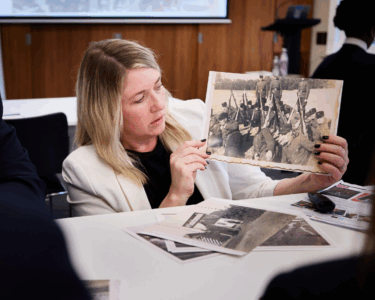A guest blog by Mike Armiger to mark World Mental Health Day’ 2022:
‘Anyone else crave for a good or slow news day? I can see you all raising your hands or nodding. Throughout history, our world, communities, students, and educators, have faced substantial challenges. This world mental health day, we find ourselves in a familiar position of pressure on many fronts.
There are too many to list here but the current petri dish of political, social, geological, health, economic and educational challenges, is one that we will all come into contact with, in some form.
There are of course historical parallels here for us to draw from especially in the area of Holocaust and genocide education. We know that these conditions can contribute to a rise in extremism. That the adversity people face can affect their families, communities and the next generation should it do unmitigated.
On top of our existing fatigue from the past few years, this combination is something we need to consider carefully as a profession. Too often we are asked to consider materialistic, tokenistic, wellbeing strategies that not only fail to mitigate the difficulties we face, but occasionally, encourage a loss of faith in MHWB agendas in educational settings. All too often I see colleagues who feel helpless in the face of the current climate. We always rise to the challenges we face around us by responding through education, personal development, and the support we offer so brilliantly in many of our schools. We hold the line so often on the values we all hold dear. But whilst that is vital and often impactful beyond measure, I instead wanted to ask you to consider something else on this world mental health day.
We need to talk about hope.
Not false hope. Not hope for the sake of it. Not hope that dresses up horror or significant challenge. But real, tangible, felt, hope. Cultivating hope is of course challenging in difficult times. I mean you can’t hope your way out of some of the challenges we face. There’s no denying that. But we know that a lack of hope can often be correlated with people’s distress. When they feel an absence of it, that’s often where distress festers, evolves and intensifies.
Hope, when done well, can balance our equilibriums, provide comfort and at our most difficult moments, provide us with reasons for living. We need these reasons for living, more than ever. We need a culture in our schools where we cultivate, celebrate and cherish these reasons for living.
In Holocaust education we not only educate young people on the stark reality of the suffering and pain inflicted on people. We also educate them about the resistance, the multiple acts of compassion and solidarity such as the kindertransport. We teach this because we want our students to see the world though both lenses. We want them to feel empowered to make a change. We do this by literally sharing hopeful stories.
Educating students on these events is no mean feat psychologically. It is an emotional experience. Being immersed in that period of history can often bring with it a sense of contamination. We are, after all, connecting with murder, evil and the very worst of humanity. Tracy Robins was my history teacher and my idol. I still remember how human she was in covering this topic. She answered questions, helped us process what we had seen, shared with us the hopeful narratives and stories of love, resistance and resilience. But most importantly, she was very clear, that we had to hear the messages of hope from survivors and their families. This was the most impactful for me. Hearing Elie Wiesel talk so movingly, yet hopefully, about the experiences and humanity people showed during unimaginable horror, helped me process what I had learnt and feel empowered, rather than just horrified. Whilst many do it masterfully, we should never forget the skill, compassion, and sense of purpose that those delivering this topic bring.
That is why the UCL Centre for Holocaust Education’s work is so important: its pedagogy is rooted in historical fact yet humanises the history, foregrounding testimony, personal stories and powerful use of artefact like a child’s toy truck. The Centre’s approach both champions and challenges notions of duty of care (for the students, a regard for the sensitive history, respect for the victims and survivors, but also teacher wellbeing) – what duty of care is and is not, and they understand both the cognitive and affective dimensions vital in all learning. That the Centre uses its research to inform and shape its CPD programmes, ensures that it remains attuned to new and emerging issues, prevailing concerns, and misconceptions and able to offer packages of training and support that meets evolving need and challenge. This training not only focuses on securing subject and disciplinary knowledge, of course important to Holocaust education, to ensure accuracy in an age of fake news, denial, distortion, and minimisation, but builds teacher confidence, develops skills, and encourages colleagues to tackle that which makes us uncomfortable in the classroom, offering guidance to ensure teachers immersed in this history take care of themselves. They recognise we are human first, professional second – and that if the important work of Holocaust education is to be delivered well, we need healthy and emotionally literate teachers.
Many of us are empaths. Affected deeply by the ongoings around us, never mind the difficulties we face internally. A reflection that someone once shared with me, has helped me understand the need to balance the lenses that we see the world through.
Our empathetic lens is key to acknowledging the reality of our surroundings. The pain, the hardship, the human suffering and it encourages us to not turn away. The key, they said, was to ensure that whilst we acknowledge that reality, we also ensure the other lens, the lens of hope, is in the other side of our daily vision. Whilst we may see the difficulty around us, do we also see the hope? One student smiling at the other, a kind act for no reason, learning happening despite personal adversity, the helpers doing courageous things daily. They are all there, each day within our schools. But do we take time to acknowledge and celebrate this? Every time we walk down the corridor feeling the weight of the challenge, do we take a moment to put that lens in?
My thinking on this year’s world mental health day, is that we need to talk less about the problems existing within people and more about how they are reacting to the world and societies in which they live.
How can we support hope building across education settings?
- Curriculum – Do we regularly share hopeful narratives and stories? E.g. when educating students on climate change, do we share the solutions as well as the challenges and consequences?
- Culture – How we do celebrate success? As a staff team? With our students?
- Community – How can our school communities be a beacon of hope for the challenges we face?
- Cultivating hope throughout and within student’s own stories – What hopeful narratives about their futures, ambitions and histories do they have?
- Building hope in interventions – SEMH interventions should regularly focus on cultivating hope. This can be done through interventions such as safety planning. See stayingsafe.net and www.wellbeingandcoping.net
I leave you with these words from Howard Zinn
To be hopeful in bad times is based on the fact that human history is not only of cruelty, but also of compassion, sacrifice, courage, kindness. If we see only the worst, it destroys our capacity to do something. If we remember those times and places where people have behaved magnificently, this gives us the energy to act. And if we do act, in however small a way, we don’t have to wait for some grand Utopian future. The future is an infinite succession of presents, and to live now as we think human beings should live, in defiance of all that is bad around us, is itself a marvellous victory.

Mike Armiger is an executive leader and independent advisor.
@MikeArmiger
*If you work in education and in need of support with your own mental health:
- Utilise any wellbeing support your school may have on offer
- Contact the Education Support partnership educationsupport.org.uk/get-help/
- Contact your union, speak to your GP
- Find local support: hubofhope.co.uk



